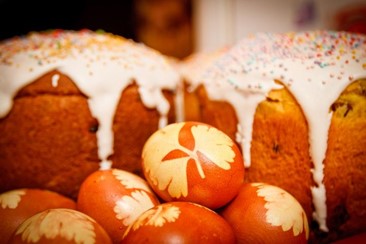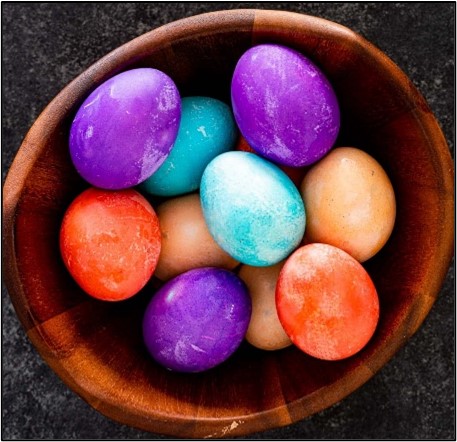|
|
||
|
||
|
Privacy Policy | Editorial Policy | Profit Policy | Join the Association | List of Members | Contact us | Index | Links |
||
|
Back Go to page: 1 2 3 4 5 6 7 8 9 10 11 12 13 14 15 16 17 18 19 20 Forward |
||
|
Contents
The meaning and time of Easter.
|
||
|
Easter.
Easter, the most important Feast Day in the Christian calendar, is a great time in Australia. The weather all over Australia is usually close to perfect, not too hot, not too cold – just how it should be. And although the Christian significance of the time has waned somewhat, to celebrate the occasion we all over-indulge in hot-cross buns and chocolate eggs, chocolate bunnies or just plain old chocolate. The kids are on holidays, the traffic around town is a million times lighter than usual with most people are off on leave.
It’s great to be Australian.
But why does Easter happen at different times each year, why isn’t there a fixed date for Easter, like the first Sunday in April for instance. Everything else has a fixed date, Christmas, ANZAC Day, Queen’s birthday, Australia Day – but not Easter. Why?
While Easter sometimes falls earlier in the year, even in March some years, Easter 2022 was April 17, so those who celebrated with family and friends did so a bit later than they would have in years past (two weeks later when compared with 2021!). Of course, this also means that the beginning of Lent and Ash Wednesday occurred later too.
Most Christians know Ash Wednesday's date depends on Easter, but wouldn't it be much simpler (and easier to remember) if Jesus Christ's resurrection were celebrated on a set day, here's a look at why that's not the case.
Ash Wednesday 2022
Ash Wednesday signals the period of 40 days before Easter, called Lent, when observants typically "give up" some earthly pleasure (wine, chocolate, sugar) as a form of penance. But what does Ash Wednesday mean?
The holiday stems from the Old Testament book of Daniel that associated fasting with ashes. Its main ritual involves a priest invoking Genesis 3:19 ("...for you are dust, and to dust you shall return.") while anointing congregants' foreheads with a mix of ash from Palm Sunday, itself derived from the story of Christ's route to Jerusalem being padded by palm fronds and sometimes oil. Lent is an acknowledgment of the 40 days the Bible says Christ spent in the wilderness.
Because Ash Wednesday kicks off the Lenten season, its date is always exactly 46 days before Easter (40 days of Lent, plus six, as each Sunday is skipped) and thus is affected directly by what date Easter falls on that year. This year, Ash Wednesday began on Wednesday, the 2nd March.
Which brings us to our central question: Why is Easter on a different date each year? and why was it on the 17th April 2022, this year, which is later than last year and the year before? The holiday, which celebrates Christ's resurrection from the grave following his crucifixion, can occur on any Sunday between March 22 and April 25. (That’s a pretty wide range!)
|
||
|
|
||
|
Easter's exact date varies so much because it actually depends on the moon. The holiday is set to coincide with the first Sunday after the Paschal Full Moon, the first full moon after the vernal equinox. (Two moments in the year when the Sun is exactly above the Equator and day and night are of equal length) Early Christians wanted Easter to coincide with Passover, because Christ's death and resurrection happened after the Jewish holiday. Though the equinox's exact date can vary each year (this year it occurred on the 20th March) the church always recognizes the vernal equinox as the 21st March. This year the first full moon to occur after the 21st March happened on Saturday the 16th April so Easter Sunday was the following day.
The word “Paschal,” which is used in the ecclesiastical (Christian church) calendar, comes from “Pascha,” a transliteration of the Aramaic word meaning “Passover.” In reference to the full Moon, Paschal refers to the date of the full Moon determined many years ago as the 14th day of a lunar month. Ancient calculations (made in 325 AD) did not take into account certain lunar motions, so the Paschal Full Moon is the 14th day of a lunar month occurring on or after the 21st March, This is according to a fixed set of ecclesiastical calendar rules, which does not always match the date of the astronomical full Moon nearest the astronomical spring equinox.
It sounds complicated, but the basic idea is to make it simpler to calculate the date for modern calendars. Rest assured, the dates for Easter are calculated long in advance. See past and future Easter dates here.
Where did the word Easter come from?
The exact origin of the word “Easter” is unclear. It’s not as simple as saying it has religious origins or pagan origins. Some historians suggest that it came from the phrase hebdomada alba, Latin for “white week,” used to describe the white garments new Christians wore when they were baptized during Holy Week. In Old German, the word became esostarum and, eventually, Easter.
The Venerable Bede, a seventh-century Anglo-Saxon historian also known as Saint Bede, writes that the word Easter comes from the Anglo-Saxon dawn goddess of fertility Eostre, also the goddess of the dawn, who originated in what is now Scandinavia. Over time, early Christians started referring to the Feast of the Resurrection by the name of the month in which it was celebrated, Eosturmonath (what we now call April).
Alternatively, Easter may have from an old German word for “east,” which in turn is derived from a Latin word for “dawn.” In the past, the word Easter could mean “to turn toward the east” or “rising” and didn’t necessarily have any implied religious meaning.
Bottom line, no one truly knows the origin of the word, “Easter” though it is one of the oldest Old English words.
|
||
|
|
||
|
|
||
|
Why do we give eggs – and from a rabbit??
Easter eggs are believed to have originated in medieval Europe but may have been unrelated to any Christian tradition. Some historians believe Easter eggs came from Anglo-Saxon festivals in the spring to celebrate the pagan goddess Eostre. The goddess, who may be the namesake of Easter, represented the dawn in spring and eggs were buried and eaten during the festival. Eggs are believed to be a symbol of fertility and the rebirth of nature after the dead of winter.
Many pagan traditions from the festival of Eostre were adopted by Christian missionaries to celebrate the resurrection of Jesus, as a way to encourage conversion. Easter eggs are often said to tie into the celebration because they represent new life, though the metaphor may have been applied retroactively. An alternative origin links Easter eggs to fasting during Lent, when animal products couldn’t be eaten. Eggs may have been hard-boiled and stored and then eaten at the end of Lent to celebrate the resurrection of Jesus.
Why do we colour Easter eggs?
The tradition of dyed and decorated eggs dates back to the 13th century when nobles would exchange them as gifts. English villagers would also frequently give eggs to their church on Good Friday. Through the religious perspective, another source argues that in Mesopotamia, early Christians dyed eggs red to mimic the blood that Jesus shed during his crucifixion, however, the tradition of dyeing eggs originated at least some 2,500 years ago in the Trypillian culture that lived in Central Europe. Historians believe the ancient Persians, or Zoroastrians, painted eggs for Nowruz, or Persian New Year.
In the 12th century, King Edward I of England ordered 450 eggs to be coloured and decorated with gold leaf to give to royal relatives during the spring season. The tradition continued a few years later when the Vatican sent Henry VIII an egg in a silver case to mark the Easter season.
How has the Easter egg hunt evolved throughout history?
The tradition of Easter egg hunts and gifting eggs to children originated in Germany in the 17th century. As a child, Queen Victoria enjoyed egg hunts put on by her German mother and helped popularize the tradition in Great Britain. Artificial eggs containing toys and treats began supplanting real eggs in Victorian England. European candy manufacturers also began to make egg-shaped chocolates and candies for Easter in the 19th century. Egg rolling also became a popular children’s activity, and the White House held its first Easter egg roll in 1878 during Rutherford Hayes’ presidency. Even though the event has no religious significance, some have considered egg rolling symbolic of the stone blocking Jesus’ tomb being rolled away, leading to his resurrection.
How does the Easter Bunny fit into the egg tradition?
The exact origin of the Easter Bunny remains unclear. The tradition may have first arrived in the United States in the 17th century with German migrants who settled in Pennsylvania, adopted from the German tradition of an egg-laying hare called Ostergase or Oschter Haws. The Germans also invented Santa Claus. The custom eventually spread across the country with the bunny giving out treats and gifts in decorated baskets.
|
||
|
|
||
|
|
||
|
|
||
|
Back Go to page: 1 2 3 4 5 6 7 8 9 10 11 12 13 14 15 16 17 18 19 20 Forward |
||






